In one of the last benchmarking sessions prior to the new Linux-Bench script becoming the standard at STH, we have Intel Xeon E5-1660 V2 benchmarks. The Intel Xeon E5-1660 V2 is a 6 core 12 thread part that only works in single threaded applications. The upside is that one gets a 3.7GHz base clock and a 4GHz turbo clock along with 15MB of last level cache. The net impact is a fairly speedy platform for workstations, and applications like databases that can utilize higher clock speeds.
Test Configuration
We built a typical test configuration to test the Xeon E5 UP processor.
- CPU: Intel Xeon E5-1660 V2
- Motherboard: Gigabyte GA-6PXSV4
- Memory: 8x Samsung 16GB 1600MHz DDR3 ECC RDIMMs
- SSD: 2x Samsung 840 Pro 256GB 8x Crucial M500 240GB, 2x SanDisk Extreme II 240GB
- GPU: NVIDIA Quadro K4000
- Operating System: Ubuntu 14.04 LTS, Windows Server 2012 R2, VMware ESXi 5.5
Of course, this is a bit more than we needed for the benchmarks but certainly interesting nonetheless.
Intel Xeon E5-1660 V2 Benchmarks
We are in the midst up updating our Linux benchmarking suite. As a result, we now have an online Linux benchmark – cpu online results viewer available with our old data set. Currently, our new 2014 Linux benchmarking test script is nearing completion. Information and results will be found here as it becomes available: Linux-Bench.com
Today’s benchmarks are using the old STHbench.sh script that we have used for over a year.
Hardinfo Performance
hardinfo is a well known Linux benchmark that has been around for years. It tests a number of CPU performance aspects. One major advantage is that one can run this out of the box from many Ubuntu installations.
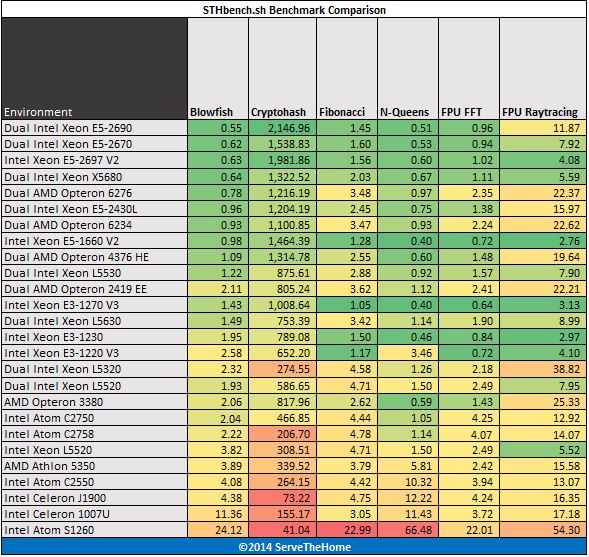
One can see a clear trend. The Intel Xeon E5-1660 V2 has great single-threaded performance. In multi-threaded tests, the chips are competitive with previous generation, dual socket and lower clocked parts. For example, in the Blowfish tests the processor is faster than dual Intel Xeon L5630’s.
UnixBench 5.1.3 Performance
UnixBench may be a defacto standard for Linux benchmarking these days. There are two main versions, one that tests single CPU performance on that tests multiple CPU performance. UnixBench segments these results. We run both sets of CPU tests. Here are the single threaded results:
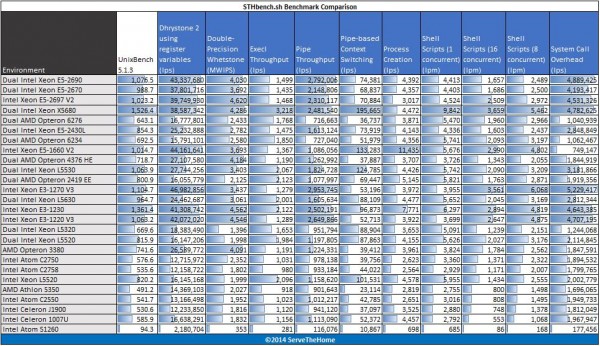
Since these are single threaded benchmarks, we see excellent speeds from the E5-1660 V2. It provides performance on par or better than the Intel Xeon E3 V3 series which typically performs well here.
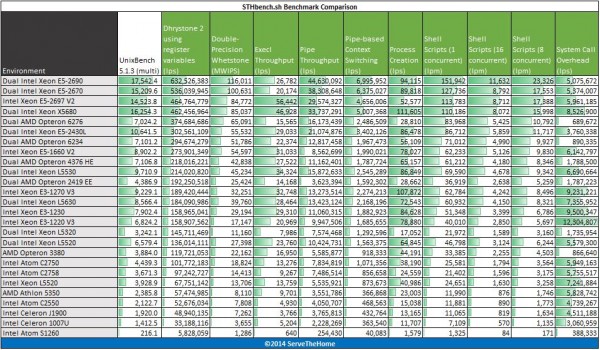
In terms of multi-threaded benchmarks, the E5-1660 V2 performs well but some of the larger dual socket systems have a clear advantage.
c-ray 1.1 Performance
c-ray is a very interesting ray tracing benchmark. It provides both consistent results and some clear separation. Ray tracing is generally a great multi-threaded CPU benchmark. We did see over the course of STHbench that dual socket systems were destroying even our “hard” benchmark. The new Linux-Bench will implement a third test to stress larger systems.
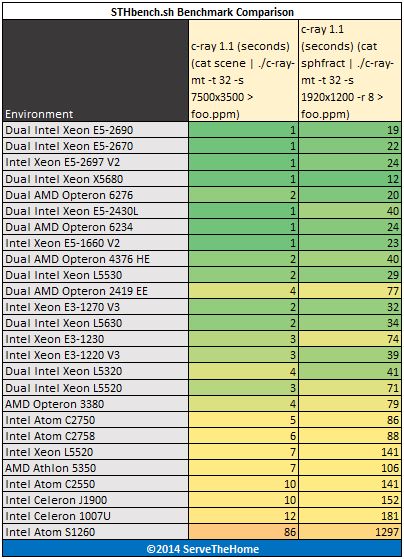
Here we can see the single Intel Xeon E5-1660 V2 outperforms dual AMD Opteron 6234 processors which is fairly amazing.
Phoronix Test Suite Performance
We are using four tests from the Phoronix Test Suite: pts/stream, pts/compress-7zip, pts/openssl and pts/pybench.
- STREAM by John D. McCalpin, Ph.D. is a very well known memory benchmark benchmark.
- 7-zip compression benchmarks were a mainstay in our Windows suite so we are including it again on the Linux side as a compression benchmark.
- The pts/openssl benchmark is very dependent on the CPU architecture being used
- Python is a widely used scripting language and pyBench is a nice single-threaded Python benchmark
Our PTS tests are being removed in Linux-Bench. The OpenSSL, STREAM and 7zip tests will be recreated and expanded in the new benchmark suite.
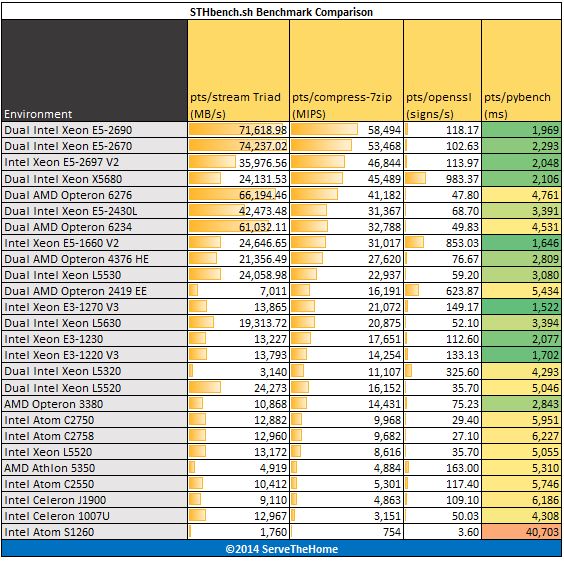
Likely the most instructive benchmark results are the 7zip ones where we can clearly see the Xeon E5-1660 V2 compete well with some dual socket configurations.
Crafty Chess Performance
Crafty is a well known chess benchmark. It is also one where we saw issues last time with the Phoronix Test Suite and running on ARM CPUs. We are planning to retire this benchmark in Linux-Bench. Here are the Crafty Chess results from simply running “crafty bench”:
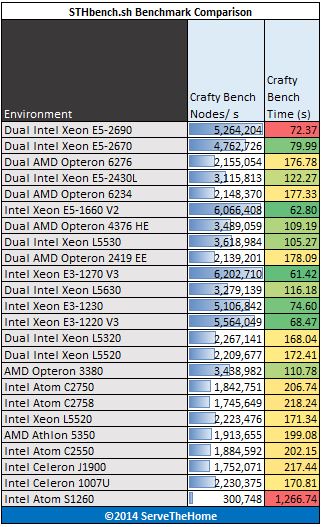
Again, as a single threaded benchmark the UP Xeon E5 performs well due to a high clock speed. It turns in our second highest result ever.
Conclusion
Overall, the Intel Xeon E5-1660 V2 is a very fast single socket processor. It is priced accordingly carrying a street price of around $1000. On the other hand, compared to two Intel Xeon E3-1230 V3 systems it does have a decent value proposition. It can handle about the same processing power with more PCIe lanes and more memory capacity. This is certainly one of the more interesting platforms out there.

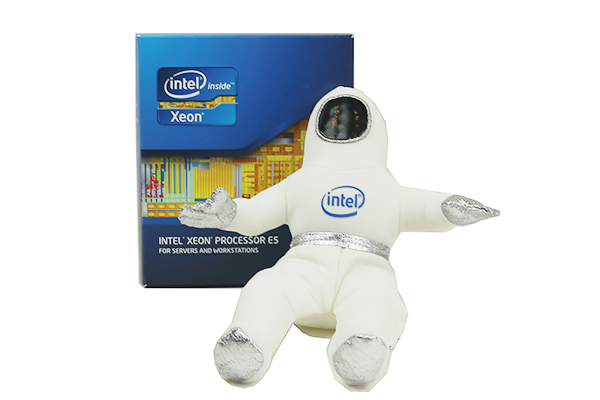
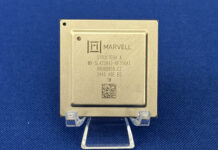


Patrick, When you said “The Intel Xeon E5-1660 V2 … only works in single threaded applications”, did you really mean “single socket” applications? Bud
In almost all cases E5-1650v2 would be a better deal due to an almost identical performance and much lower price (<$600)